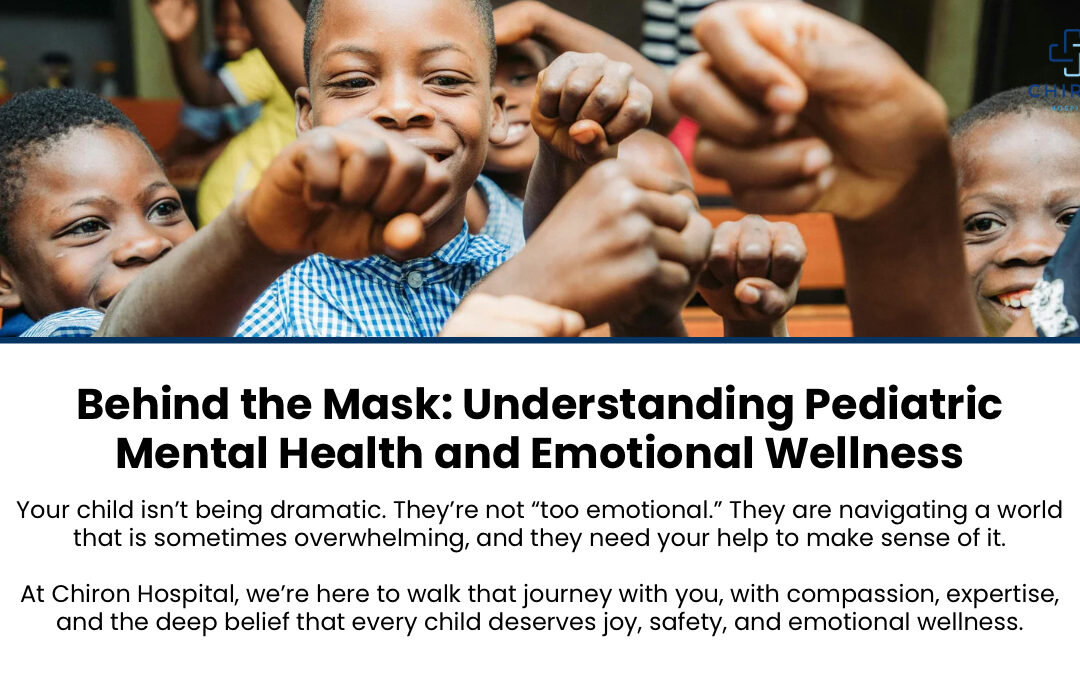“He’s just acting out”.
“She’s quiet, maybe she’s shy”.
“They’ll grow out of it”.
These are phrases we hear all too often when it comes to children’s behavior, especially in Nigeria. But sometimes, what we think of as “moodiness,” “disobedience,” or “quietness” is something more: a child silently struggling with their mental and emotional health.
At Chiron Hospital, we’re seeing more children who aren’t just physically unwell, they’re emotionally overwhelmed. And in a society that rarely talks about pediatric mental health, many of these children are misunderstood, misdiagnosed, or simply ignored.
What Is Pediatric Mental Health?
Pediatric mental health refers to how children think, feel, behave, and relate to others. Just like adults, children can experience stress, anxiety, depression, trauma, and emotional challenges. The difference is: children often don’t have the words to describe how they’re feeling. Instead, they speak through their behavior or silence.
Mental health issues in children can impact every area of life school, relationships, sleep, eating habits, and even physical health.
What Are the Signs Something Is Wrong?
Mental health challenges in children often hide in plain sight. Some warning signs include:
• Sudden withdrawal from friends or activities
• Changes in eating or sleeping habits
• Frequent stomach aches or headaches with no medical cause
• Persistent sadness or tearfulness
• Irritability or anger outbursts
• Excessive worry or fearfulness
• Decline in academic performance
• Talking about death, running away, or self-harm
• Repetitive behaviors or obsessive thoughts
Sometimes, it’s not loud behavior, I t’s the quiet that should worry us most.
A Real Story: When Aisha Started Fading
Eight-year-old Aisha was once bubbly, creative, and always eager to go to school. But after a family relocation and the death of her grandmother, her personality changed. She stopped drawing. Stopped eating well. Complained of headaches almost daily. Her parents thought she just needed time.
It wasn’t until she began refusing to go to school entirely hiding in her room for hours, that they sought help.
At Chiron Hospital, she was seen by our pediatric mental health team. Her symptoms pointed to childhood depression and anxiety, triggered by unresolved grief and major life change. With consistent counseling, support from her parents, and a safe space to talk, Aisha began to smile again.
What Causes Mental Health Struggles in Children?
There’s never one answer. Children’s minds are shaped by both internal and external factors. Some common causes include:
• Family stress (divorce, death, financial instability)
• Bullying or peer pressure
• Abuse or neglect
• Chronic illness or disability
• Academic pressure
• Social media overexposure
• Traumatic events (accidents, witnessing violence)
In some cases, genetics also play a role, a family history of anxiety, depression, or ADHD may increase risk.
Why Mental Health in Children Is Often Ignored
In many cultures, especially in Africa, emotional struggles are stigmatized. A child who cries often is labeled “spoilt.” A boy who doesn’t talk is “not man enough.” A teen who isolates is “just being difficult.”
Mental health is not weakness. And in children, early support can change a lifetime.
How We Support Children at Chiron Hospital
At Chiron, we treat the whole child, not just the physical symptoms. Our pediatric mental health team includes psychologists, pediatricians, and therapists trained to:
• Build trust with children through talk, play, and art
• Help parents understand and support their child’s emotions
• Provide coping tools for stress, grief, trauma, and anxiety
• Work with schools to create supportive environments
Whether it’s a 5-year-old with separation anxiety or a 12-year-old dealing with bullying, we offer a safe, warm environment where kids can breathe, express, and heal.
What Parents Can Do
If you’re concerned about your child’s emotional wellbeing:
• Don’t dismiss it. Trust your gut.
• Create an open, non-judgmental space to talk.
• Limit exposure to distressing content or conversations.
• Keep routines predictable and secure.
• Encourage physical activity and creative expression.
• Seek professional help early, don’t wait for a “breakdown.”
Final Thoughts: Children Deserve to Be Heard
Your child isn’t being dramatic. They’re not “too emotional.” They are navigating a world that is sometimes overwhelming, and they need your help to make sense of it.
At Chiron Hospital, we’re here to walk that journey with you, with compassion, expertise, and the deep belief that every child deserves joy, safety, and emotional wellness.
📞 Book a confidential consultation today: +234 909 000 1078
📧 Email: admin@chironhospital.org
🌐 Visit: www.chironhospital.org
#ChildMentalHealth #EmotionalWellnessForKids #ChildrenDeserveBetter #ChironCares #ParentingInLagos #ChildrenHospitalInLagos
#SepsisAwareness #ChironCares #EmergencyCareLagos #ICUinLagos
#SaferBirths #MaternalHealth #ChironHospital #NeonatalCare #EveryMotherMatters #EveryBabyMatters #ICUCare


Recent Comments